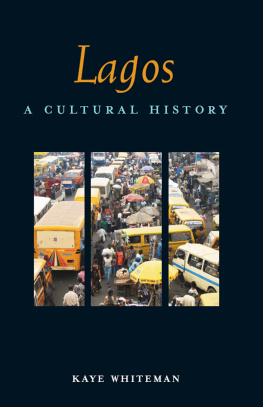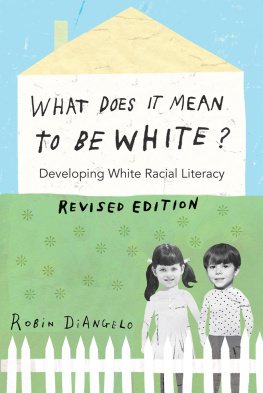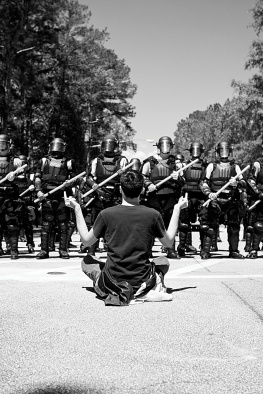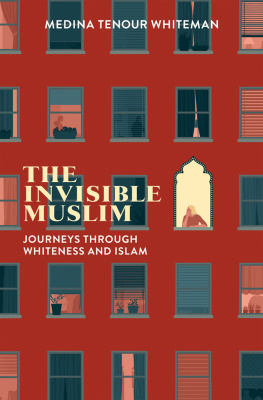IRA BASHKOW is assistant professor of anthropology at the University of Virginia.
The University of Chicago Press, Chicago 60637
The University of Chicago Press, Ltd., London
2006 by The University of Chicago
All rights reserved. Published 2006
Printed in the United States of America
15 14 13 12 11 10 09 08 07 06 1 2 3 4 5
ISBN: 0-226-03890-4 (cloth)
ISBN: 0-226-03891-2 (paper)
ISBN: 978-0-226-53006-2 (ebook)
Library of Congress Cataloging-in-Publication Data
Bashkow, Ira
The meaning of whitemen : race and modernity in the Orokaiva cultural world / Ira Bashkow.
p. cm.
Includes bibliographical references and index.
ISBN 0-226-03890-4 (cloth : alk. paper) ISBN 0-226-03891-2 (pbk.: alk. paper)
1. Orokaiva (Papua New Guinea people)Ethnic identity. 2. Orokaiva (Papua New Guinea people)Psychology. 3. Orokaiva (Papua New Guinea people)Attitudes. 4. BlacksRace identityPapua New GuineaOro Province. 5. First contact of aboriginal peoples with WesternersPapua New GuineaOro Province. 6. EthnopsychologyPapua New GuineaOro Province. 7. Race awarenessPapua New GuineaOro Province. 8. Oro Province (Papua New Guinea)Race relations. 9. Oro Province (Papua New Guinea)Social conditions. I. Title.
DU740.42B375 2006
305.800995309045dc22
2005031375

The paper used in this publication meets the minimum requirements of the American National Standard for Information SciencesPermanence of Paper for Printed Library Materials, ANSI Z39.48-1992.
I DEDICATE THIS BOOK TO STEVEN SEAMBO AND THE PEOPLE OF AGENEHAMBO:
Nau ajamama, epemane, nameikamei, duepone, hovapahu, meni hatira, na umo ere pekihena. Oro-ta puvuto ungota simba ue, pure donda indihe, ahepoekari umbuhe, jawotoho be ere mihahena. Mihima tao, avo toto egerembeto pambuto Amerika-ta puvuto ke iroja keto avo ijie hihi kaeto kito buku-ta ikihene pambei kijo. Amita jota amo hihi be mane-ra, ke jo be jo mane-ra, amo hamo ke pere-ra. Amo taupamane-ta hihi, enana-ta irariumbari mo dainge, kaiva embomeni-ta tihi-ta. Aingeto kito amo pure isapa ra, amo kastom-ta ke pepeni-papeni mane-ra, te amita jota amo-re nau humota ari, nau tungambari, mine ari amita hajire kijo. Avora, ke evi kakane ere ua, pekihena jo aima-na kijo, na Aira Robert Bashkow avo erena.
Acknowledgments
Although these pages explain that Orokaiva typify whitemen as persons unencumbered by heavy social obligations who thus are said to be light, I have become, in the course of years of research and writing of this book, extremely heavy with the substantial debts I owe to many who have contributed to the work and sustained me during its preparation.
Writing was supported by a National Endowment for the Humanities Fellowship and a Richard Carley Hunt Postdoctoral Fellowship from the Wenner-Gren Foundation for Anthropological Research. The main fieldwork and archival research on which the study is based was conducted from December 1992 to June 1994 and January to September 1995 with funding from a Wenner-Gren Dissertation Fieldwork Grant and a Fulbright-Hays Dissertation Research Abroad Fellowship. In Papua New Guinea (PNG), the National Research Institute extended the status of Research Associate. I am grateful to all these institutions for their critical help. Any views, findings, conclusions, or recommendations expressed in this book do not necessarily reflect those of the National Endowment for the Humanities, the U.S. Department of Education, or the PNG National Research Institute.
At the University of Virginia, I have enjoyed the intellectual friendship of wonderful colleagues in the Department of Anthropology, which has provided a supportive environment for developing this book and seeing it through to completion. In particular I would like to thank Fred Damon, Richard Handler, Susan McKinnon, Peter Metcalf, and Roy Wagner for reading and commenting on chapter drafts or the dissertation on which the book is based, as well as for their professional guidance and mentorship. I thank Jeff Hantman for his good-natured coaching through the final phases of writing and rewriting, and Dan Lefkowitz and Wende Marshall for helpful conversations about the books arguments. I am grateful to the students in my courses Whiteness and How Others See Us in 2001, 2003, and 2004, in which key parts of the books argument took shape. The University of Virginias Vice President for Research and Graduate Studies provided funding for summer writing and, with the Dean of the College of Arts and Sciences, a grant to help support the cost of preparing the work for publication.
This book originated as my doctoral dissertation in anthropology at the University of Chicago. I feel an inexhaustible debt of gratitude to George Stocking for his consistent support of my growth as a scholar, for his encouragement of my interest in the history of western understandings of others, and his advice that I pursue it within the discipline of anthropology. His support for my research extended to the point of contributing financially to a feast I held in Agenehambo, and his confidence in the value of my work has been a lodestar helping me keep on course for all this long journey. I also thank Nancy Munn for my first and most rigorous training in ethnographic analysis, and for the example of her own New Guinea research, which has been formative for me. In numerous conversations, she pushed me to think beyond ordinary categories of ethnographic analysis and helped define my framework for understanding the role of whitemen in Orokaiva morality. To Marshall Sahlins I am grateful for establishing important ideas that I now take for granted, for recognizing the theoretical significance of parts of my project when they were as yet inchoate, and for asking deceptively simple questions that significantly advanced my understanding of my material. I am mindful too of my debt to other Chicago teachers and mentors, including Arjun Appadurai, the late Barney Cohn, Jean and John Comaroff, Jim Fernandez, Bill Hanks, John Kelly, Ralph Nicholas, Michael Silverstein, Terry Turner, and the late Valerio Valeri. I thank my dissertation group for much-needed encouragement when my writing was in the fledgling stages: Greg Downey, Anne Lorimer, Susan Seizer, Terry Silvio, Seung-Hoon Song, and Rupert Stasch. For their responses to an early draft of , I additionally thank colleagues in the Pacific Ethnography Reading Group at Chicago: Alex Golub, Fred Henry, Don Kulick, Debra McDougall, Daniel Rosenblatt, Danilyn Rutherford, and Michael Scott. Special thanks go to Barney Bate, whose enthusiasm after reading two chapters in draft provided a crucial boost to my belief in the project at a critical stage. Certain basic ideas in this work emerged synergistically out of my conversations with Matti Bunzl, Greg Downey, Anne Lorimer, Daniel Rosenblatt, and Rupert Stasch, to all of whom I am grateful for their colleagueship and enduring friendship. For logistical support during my fieldwork, my thanks go to Anne Chien.
At the University of Chicago Press, I am grateful to David Brent for his clear, early support of this project and to Elizabeth Branch Dyson for shepherding it through the production process with such grace and care. Insightful comments by the anonymous reviewers allowed me to strengthen the clarity of key arguments. Linda Berry of Designers Ink in Charlottesville cheerfully embraced the ins and outs of taro planting, feast piles, babies sleeping in string bags, and so on, in order to produce the books fine illustrations and maps.






 The paper used in this publication meets the minimum requirements of the American National Standard for Information SciencesPermanence of Paper for Printed Library Materials, ANSI Z39.48-1992.
The paper used in this publication meets the minimum requirements of the American National Standard for Information SciencesPermanence of Paper for Printed Library Materials, ANSI Z39.48-1992.